President Barack Obama will announce a major surge in U.S. aid to fight the Ebola epidemic in West Africa later on Tuesday, with as many as 3,000 military personnel to help organize, train new health care workers and build treatment clinics.
The Department of Defense will divert $500 million for the effort, which will include building 17 new treatment centers with 100 beds each, 10,000 sets of personal protective equipment and the distribution of supplies such as disinfectant and hand sanitizer to help 400,000 families protect themselves and care for sick family members.
"The Ebola epidemic in West Africa and the humanitarian crisis there is a top national security priority for the United States," the White House said in a statement. Obama will announce details when he visits the headquarters of the Centers for Disease Control and Prevention in Atlanta.
Senior administration officials, who asked not to be identified because they don't want to upstage the president, said they believe the surge will start to turn the epidemic around. The World Health Organization (WHO), local leaders and aid groups in West African have all said the epidemic is raging out of control. WHO's latest count has 4,784 people infected, and 2,400 of them dead, but experts all say that's an underestimate as many cases almost certainly have gone uncounted.
Read MoreEbola virus: 'Horrible way to die' and no vaccine
WHO says as many as 20,000 could be infected in the coming months. One senior administration official said it could spike to hundreds of thousands.
The ramp-up should create a "backbone" that will give other countries the confidence to send in supplies and money to help, the officials said. There will be a U.S. general coordinating command and control efforts, but the officials said everything will be coordinated with international groups such as WHO and with local governments. They declined to say it amounted to a U.S. takeover of the aid effort.
More from NBC News:
ISIS Threatens to Behead Iraqi Journalist
Rice appeal will include request that Goodell recuse himself
Ex-Auschwitz Guard Accused of Role in 300K Deaths
The U.S. Africa Command will train as many as 500 new healthcare workers a week for six months and longer if needed. WHO and aid groups such as Medecins Sans Frontieres (MSF or Doctors Without Borders) have said medical staff are by far the greatest need.
"U.S. Africa Command will establish a regional intermediate staging base to facilitate and expedite the transportation of equipment, supplies and personnel," the White House said in a statement. "Just as the outbreak has worsened, our response will be commensurate with the challenge."

Eventually, the U.S. will supply hundreds of thousands of the needed sets of personal protective equipment—which include full body suits, gloves, boots, goggles and masks to protect healthcare workers from the virus. Families will get smaller kits
"In partnership with the United Nations Children Fund, the Paul Allen Family Foundation, and other key partners, we will immediately target the 400,000 most vulnerable households in Liberia," the White House said.
"As part of this effort, this week, USAID will airlift 50,000 home health care kits from Denmark to Liberia to be hand-delivered to distant communities by trained youth volunteers."
Ebola is spread through bodily fluids and people must be in direct contact, so doctors, nurses and other caregivers, including family members, as well as people preparing bodies for burial or disposal, are at highest risk. Experts say good infection control can prevent its spread.
Read MoreEbola fears reach US shores: Hype or real threat?
In a sad acknowledgement that many more deaths will come before the epidemic is ended, the U.S. will also send 5,000 body bags.
The U.S. has already promised or spent $175 million in fighting the epidemic in Guinea, Sierra Leone and Liberia, and has asked Congress for another $88 million. The government's operating without a proper budget but Congress can appropriate the money as part of the emergency legislation, called the continuing resolution, that keeps the government running.
The plans appear to take on board the many calls for the U.S. to greatly step up its involvement, and also for unorthodox treatment approaches. Samaritan's Purse president Franklin Graham, whose group has played a heavy role in fighting Liberia, told NBC News that he thought hospitals were part of the problem and stand-alone isolation units may be a better solution.
And groups such as MSF have said it's "incomprehensible" that the U.S. and other countries haven't done more before now.
Read MoreDeadly Ebola virus spreads—and so do fears
The White House defended its efforts, saying it's done more to fight this outbreak than any other disease outbreak:
"Last month, USAID airlifted more than 16 tons of medical supplies and emergency equipment to Liberia, including: 10,000 sets of personal protective equipment, two water treatment units and two portable water tanks capable of storing 10,000 liters each, and 100 rolls of plastic sheeting which can be used in the construction of Ebola treatment units," it said.
The Centers for Disease Control and Prevention (CDC) and other U.S. agencies have 100 people in West Africa, the National Institutes of Health is working to develop drugs and vaccines.
"CDC has provided on the ground expertise in the largest international response in its history," the White House said.
Read MoreLiberia says US authorities OK use of experimental Ebola drug
Later on Tuesday, the Senate health and appropriations committees will hold a hearing on Ebola. Speakers will include Dr. Kent Brantly, the medical missionary who was infected with Ebola and survived after a dramatic evacuation; Dr. Anthony Fauci, head of the National Institute of Allergy and Infectious Diseases; and Robin Robinson, who heads the Biomedical Advanced Research and Development Authority.

